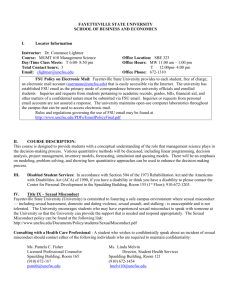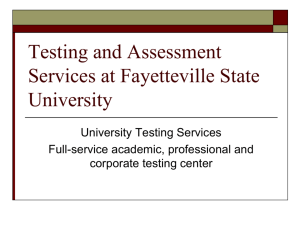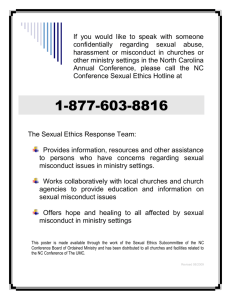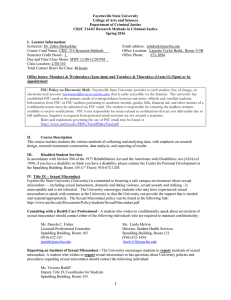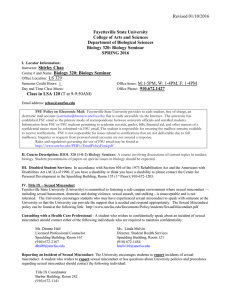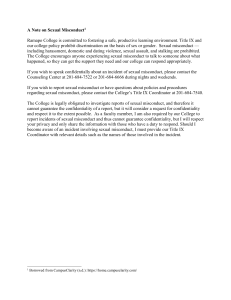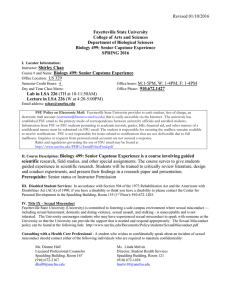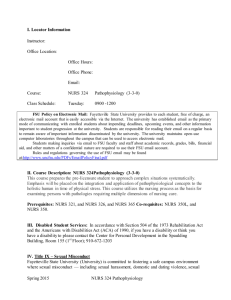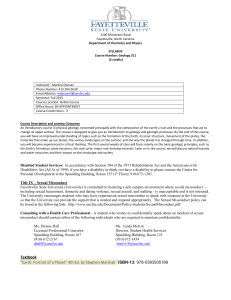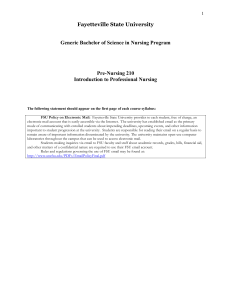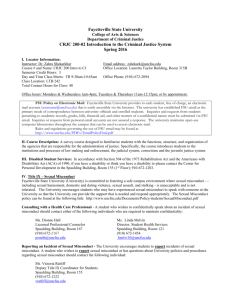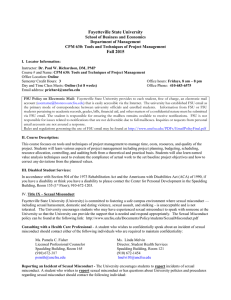COMM 210 - Fayetteville State University
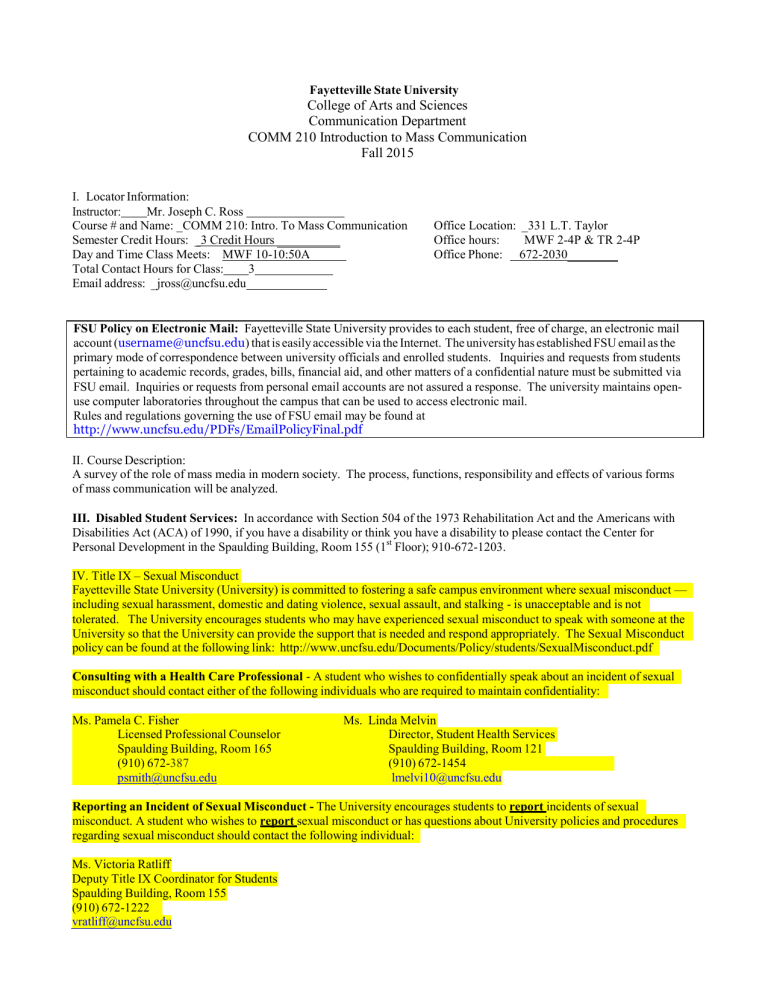
Fayetteville State University
College of Arts and Sciences
Communication Department
COMM 210 Introduction to Mass Communication
Fall 2015
I.
Locator Information:
Instructor: Mr. Joseph C. Ross
Course # and Name: _COMM 210: Intro. To Mass Communication
Semester Credit Hours: _3 Credit Hours
Day and Time Class Meets: MWF 10-10:50A
Total Contact Hours for Class:
Email address: _jross@uncfsu.edu
3
Office Location: _331 L.T. Taylor
Office hours: MWF 2-4P & TR 2-4P
Office Phone: 672-2030
FSU Policy on Electronic Mail: Fayetteville State University provides to each student, free of charge, an electronic mail account ( username@uncfsu.edu
) that is easily accessible via the Internet. The university has established FSU email as the primary mode of correspondence between university officials and enrolled students. Inquiries and requests from students pertaining to academic records, grades, bills, financial aid, and other matters of a confidential nature must be submitted via
FSU email. Inquiries or requests from personal email accounts are not assured a response. The university maintains openuse computer laboratories throughout the campus that can be used to access electronic mail.
Rules and regulations governing the use of FSU email may be found at http://www.uncfsu.edu/PDFs/EmailPolicyFinal.pdf
II.
Course Description:
A survey of the role of mass media in modern society. The process, functions, responsibility and effects of various forms of mass communication will be analyzed.
III. Disabled Student Services: In accordance with Section 504 of the 1973 Rehabilitation Act and the Americans with
Disabilities Act (ACA) of 1990, if you have a disability or think you have a disability to please contact the Center for
Personal Development in the Spaulding Building, Room 155 (1 st
Floor); 910-672-1203.
IV. Title IX – Sexual Misconduct
Fayetteville State University (University) is committed to fostering a safe campus environment where sexual misconduct — including sexual harassment, domestic and dating violence, sexual assault, and stalking - is unacceptable and is not tolerated. The University encourages students who may have experienced sexual misconduct to speak with someone at the
University so that the University can provide the support that is needed and respond appropriately. The Sexual Misconduct policy can be found at the following link: http://www.uncfsu.edu/Documents/Policy/students/SexualMisconduct.pdf
Consulting with a Health Care Professional - A student who wishes to confidentially speak about an incident of sexual misconduct should contact either of the following individuals who are required to maintain confidentiality:
Ms. Pamela C. Fisher
Licensed Professional Counselor
Spaulding Building, Room 165
(910) 672387 psmith@uncfsu.edu
Ms. Linda Melvin
Director, Student Health Services
Spaulding Building, Room 121
(910) 672-1454 lmelvi10@uncfsu.edu
Reporting an Incident of Sexual Misconduct - The University encourages students to report incidents of sexual misconduct. A student who wishes to report sexual misconduct or has questions about University policies and procedures regarding sexual misconduct should contact the following individual:
Ms. Victoria Ratliff
Deputy Title IX Coordinator for Students
Spaulding Building, Room 155
(910) 672-1222 vratliff@uncfsu.edu
Unlike the Licensed Professional Counselor or the Director of Student Health Services, the Deputy Title IX Coordinator is legally obligated to investigate reports of sexual misconduct, and therefore cannot guarantee confidentiality, but a request for confidentiality will be considered and respected to the extent possible.
Students are also encouraged to report incidents of sexual misconduct to the University’s Police and Public Safety
Department at (910) 672-1911.
V.
Textbook:
Biagi, S. (2007). Impact: An Introduction to the Mass Media. Tenth Edition. Belmont, Calif.: Wadsworth Publishing
2006.
VI.
Student Learning Outcomes –
Upon completion of this course, it is anticipated that the student will be able: a.
To generally trace the evolution of mass communication from it earliest beginnings to the modern age. b.
To understand and appreciate the roles and responsibilities of two mass media, i.e., the press, business. c.
To distinguish among several media forms and relate them to several media content. d.
To compare the mass media of various times and various societies.
VII.
Course Requirements and Evaluation Criteria
Success in this course will be based upon several factors, including: a.
Possessing textbook b.
Attending classes regularly and punctually. c.
Participating in class discussion d.
Performing satisfactorily on quizzes and exams e.
All assignments must be typed (double spaced). f.
Grade Distribution
50% Five Quizzes:
Class Presentation, using technology and Diversity:
Two Exams:
Class Participation:
20%
20%
10%
The University Grade Scales will be followed.
A= 92 – 100, B= 83 – 91, C= 73 – 82, D=64 – 72, F=Below 64
If Student assignments are evaluated using letter grades, the following conversion will be used.
A+ = 99
B+ = 91
C+ = 81
D+ = 71
A = 96
B = 88
C = 78
D = 68
A- = 93
B- = 84
C- = 74
D- = 64 g.
Participation in class discussion. h.
Students are expected to arrive to class on time, remain in class until dismissed by the instructor, and refrain from preparing to leave class until it is dismissed. . i.
Attendance at all assigned exercises and examinations. j.
Access to the Internet for web-enhance material. k.
Student/teacher relationships, as well as relationships among peers, must be respectful at all times. l.
Students are not permitted to wear headphones or other paraphernalia that may be distracting to the classroom environment. m.
Students must refrain from any activity that will disrupt the class; this includes turning off cell phones and pagers. n.
Students are not permitted to use profanity in the classroom. o.
Students will not pass notes or carry on private conversations while class is being conducted.
Consequences for Failing to Meet Behavioral Expectations : The first time a student violates one of these rules, the instructor will warn him or her privately, either after class or before the next class. (Faculty members reserve the right to warn students publicly if needed.) The second time a student violates the guidelines, the instructor may deduct as many as twenty points from the student’s next exam grade. If a student violates the guidelines three times, the instructor will report the student to the Dean of Students for disciplinary action according to the FSU Code of Student Conduct.
VIII.
Academic Support Resources –
Chestnutt Library
Telecommunication Center (CCTV)
Public Radio WFSS
Student Radio WFSB
Telecommunication Center’s Computer Editing Lab
VII. Course Outline and Assignment Schedule
Week 1& 2 Course Introduction
Definition of Terms
You in The New Information Age
Read: Chapter 1
Communication: Mass and Other Forms
Read: Chapter Two
Perspectives on Mass Communication
TEST ONE
Week 3 & 4 Read: Chapter 3
Historical and Cultural context
TEST TWO
Week 5 & 6 Read Chapter Four
Newspapers
Newspaper Assignment: Comparison of Two Newspapers
Read: Chapter Five
Magazines
Read Chapter Six
Books
Assignment: Publisher
Week 7 Read Chapter Seven
Radio
ASSIGNMENT: Radio Station Comparisons
Read Chapter Eight
Sound Recording
Week 8 Read Chapter Nine
Motion Pictures
TEST FOUR
Week 9 Read Chapter Ten
Broadcast Television
Read: Chapter Eleven
Cable, Satellite, and Internet Television
Week 8 Recording
Read: Chapter 6
Broadcasting Television
Read: Chapter 7
Week 10 Read Chapter Twelve
The Internet and the World Wide Web
TEST FIVE
Week 11 Read Chapter Fourteen
Public Relations
Read Chapter Fifteen
Advertising
PROJECT: 30 SECOND AD
PROJECT: PR CAMPAIGN
Week 12 Read Chapter 16
Formal Controls: Laws, Rules, and Regulations
Week 13 Ethics and other Informal Controls
TEST SIX
Week 14 Read Chapter Eighteen
International and Comparative Media Systems
Week 15 Read Chapter 19
Social Effects of Mass Communication
Week 16 Review and Final Exam
IX.
Teaching Strategies
Teaching strategies include:
Lectures
Discussions
Student Presentations
Panel discussions
View, review, and analysis
Bibliography
1.
Melvin L. DeFleur and Everette E. Dennis, Understanding Mass Communication , 4 th ed. (Boston: Houghton
Mifflin, 2002).
2.
Lauren Kessler, The Dissident Press (Beverly Hills: Sage, 1996).
3.
Shirley Baigi, News Talk 1 (Belmont, Calif,: Wadsworth, 1998).
4.
Lewis A. Coser, Charles Kadushin, and Walter W. Powell, Books: The Culture & Commerce of Publishing
(New York: Basic Books, 1994).
5.
John R. Bittener, Broadcast Law and Regulation (Englewood Cliffs, N.J.: Prentice-Hall 1992).
6.
R. Serge Denisoff , Solid Gold (New Brunswick, N.J.: Transaction Books, 1989).
7.
Jeff Greenfield, Television: The First Fifty Years (New York: Abrams, 1996).
8.
Jack C. Ellis, A History of American Film , 2 nd ed. (Englewood Cliffs, N.J.: Prentice-Hall, 1985).
9.
Stephen Fox, The Mirror Makers: A History of American Advertising and Its Creators (New York: Morrow,
1990).
10.
Scott M. Cutlip, Allen H. Center and Glen M. Broom, Effective Public Relations , 6 th ed. (Englewood Cliffs, N.J.:
Prentice-Hall, 1985).
11.
Ralph L. Holsinger, Media Law (New York: Random House, 1987).
12.
L. John Martin, “Africa,” Global Journalism: Survey of International Communication, 2 nd ed. (New York:
Longman, 1991).
References
Recommended Viewing
All local and network news programs, especially CNN’s Media Circus and Science This Week. Students should also try to watch the cable American Movie Channel (AMC), Arts and Entertainment Channel (A&E) and the Discovery Channel
(DISC). In additions, students are encouraged to view films shown in local theaters and on campus. Feel free to introduce these topics into classroom discussions. This class only works if you participate and ask questions.
Recommended Reading
In order to truly get everything out of this course, daily reading of newspapers and magazines is imperative. Feel free to bring in clippings to discuss in class as it pertains to the topics. In addition, I strongly recommend the following newspapers, magazines and book to broaden understanding of the media and its interaction with our culture.
Newspapers
Fayetteville Observer-Times (daily)
Raleigh New-Observer (daily)
New York Times (daily)
Washington Post (daily)
Magazines
Broadcasting and Cable (weekly)
Time (weekly)
Newsweek (weekly)
Advertising Age (weekly)Wall Street Journal (daily)
